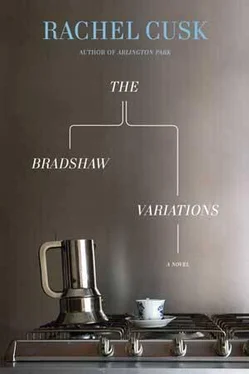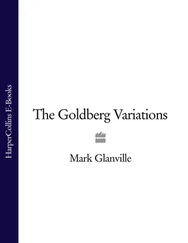Thomas offers his hand — ‘Hello again’ — and after a brief hesitation Benjamin takes it, so that he wonders whether, in fact, Benjamin finds something awkward in the male handshake, something quaintly heterosexual. It occurs to him that gay men perhaps do not shake hands, that they hug or kiss each other’s cheeks like women do. He wonders whether, next time, he will offer to hug Benjamin.
‘Nice to see you,’ Benjamin says, pressing his fingers and then releasing them.
They enter the hall, where torn pieces of brown vinyl skid underfoot and a single electric bulb hangs from a length of dirty flex. Benjamin has to duck his head to avoid hitting it. He rounds the corner, ducks again at the door to the lavishly untidy sitting room. Thomas follows him in, so closely that the pile of Benjamin’s fawn cardigan is only inches from his eyes, for there is no possibility of distance in the cramped, warren-like flat and as a consequence the human form seems more significant, more textured, denser with association. Along with its squalor, it is this that causes Thomas to identify Benjamin’s flat with youth. When he comes here he is reminded of a closer and more sensually vivid experience of the body that he did not realise, until now, he had forsaken. Sitting with Benjamin at the piano, their knees nearly touching, their hands crossing and recrossing as they explore the keys, Thomas is more physically proximate than he has been for years to anyone but his wife and child. Benjamin’s chair is a wooden schoolroom chair that creaks whenever he leans forward to turn the pages or to demonstrate something on the keys. His limbs graze Thomas’s field of vision, the legs and arms so rod-like and mathematical on their big knuckle-like hinges, the expert, spacious hands with their broad, clean nails, the firm male wrists and the vigorous brown hair of his forearm that is disclosed when he reaches up for the metronome: this is intimacy, this nearness that is always renewing itself through movement. It is hard to impress someone who is sitting so close. It has taken Thomas time to get used to the fact that it is through his hands and not his face that the impression must be produced.
Benjamin observes him unblinking behind his glasses.
‘How has it been this week?’
‘Good, I think. Fine.’
The first time, Thomas was flustered by this question, which seemed to press at some unexposed part of himself — to be somehow clinical, like a doctor’s examination of hidden regions of the body. He sought to cover himself up; he tried to re-establish in words the sense of distance he could not accomplish physically. But now he is used to the exposure. He looks forward to the acknowledgement of it, this patch cleared of shame where now, week by week, he cultivates himself.
‘You’ve kept on with the two-part invention.’
‘Actually,’ Thomas says nonchalantly, ‘I’ve started looking at the adagio .’
Benjamin arches his narrow brows. ‘The Beethoven?’
Thomas nods. He can see that Benjamin is surprised, a surprise that is faintly sceptical, so that Thomas’s heart is made to thud against his breastbone. He knows what is coming next. The fact is that unlike nearly every other aspect of his adult life, there is no getting around a claim to have learnt to play the adagio. It cannot be explained, or deferred, or talked away. He has to show that he can do it.
‘Do you have the music with you?’
‘Yes.’
‘All right, then.’
Benjamin rises, picks up his chair. He wades through the sheaves of manuscript paper that litter the filthy carpet and establishes himself three or four feet away, hands clasped attentively in his lap. His scepticism has evaporated: his brow is once more unclouded and eager. This is, after all, no place for scepticism. What would be the point of it? Thomas, when he watches Alexa carry her plate precariously to the sink, or observes Tonie reversing the car into a parking space, feels scepticism, doubt; he feels the world teetering just beyond his reach, like some toppling object he wants to grasp firmly and set squarely on its feet again. But Benjamin, apparently, will feel no such unease watching Thomas. Does he think it isn’t important, how Thomas plays the adagio? Has he decided that since Thomas’s performance represents no practical gain or loss to himself he may as well be indifferent to it? Benjamin inclines his head towards the piano. It is a courtly gesture: Thomas imagines himself inclining his head to Alexa, to Tonie, as they teeter on the brink of disaster. It signifies that Benjamin has left the field, the keyboard that sometimes seems to grin like a set of teeth and sometimes to glimmer like a far-off frozen landscape, a place as beautiful as it is inhuman, whose silence is occasionally interrupted by the sounds of struggle before swallowing them up again.
Benjamin clears his throat: ‘When you’re ready.’
The truth is that for the past week Thomas has worked on the adagio like a solitary prisoner tunnelling under the fortress walls. He is slightly ashamed of it, his secret determination, the rigidity of his methods, the insistent, repetitive labour he has put into it, for this is how he has always got the things he wanted in life, and how he has got the better of what he didn’t want too. It has felt like cheating, just as it did when he studied all night to pass an exam, or got through the tedium of meetings by knowing more than anyone else, or planned down to the last detail his strategy for attracting the attention of a woman he liked. It has always seemed that work occupied the place where something more natural ought to have been, something instinctive and innate, something he associates with honesty, though he doesn’t know exactly why. Sitting at the piano, he has felt sure that there is a more honest way of learning the adagio than to play each bar until its sanity has been broken down and become a rattling box of madness, but he has been unable to think of what it might be. He has felt a fleeting, bitter discouragement, even as his fingers were fumbling with and then tentatively mastering the music, for his decision to learn an instrument contains a nameless hope that seems to be being confounded before his eyes. He imagined, secretly, a kind of abandon awaiting him somewhere within its discipline; imagined himself freed, untethered by it to wander in great white fields of self-expression. But all that has happened is that ever-larger distances of method and minutiae have been disclosed that have turned the screws of his personality even tighter.
‘As I say, I’ve barely even scratched the surface,’ he says to Benjamin. ‘It’s hard to find the time. You know how it is.’
Benjamin inclines his head again, smiling.
‘Well, here goes,’ Thomas says.
For an instant his mind is filled with the white light of performance, the strange featureless lucidity left behind by the knowledge that he mustn’t think, that his brain must be vacated, that instead he must act; and the next time he checks, he sees that he is already halfway down the first page, and the thinking makes him falter so he quickly vacates his brain again and returns to his hands. There is an awful passage that is like inching along a narrow ledge, and then a period when he seems to be safe in miles of firm level ground; then suddenly it is a cataract, a rushing to the edge, to disaster, and over he goes, swept down through the complexity and out the other side, where there is stillness and daylight and the untidy room with Benjamin sitting in his chair.
‘Bravo!’ Benjamin says, very flushed and astonished-looking.
The bedroom door flies open. It is Ignatius, as ruddy and squat and prodigiously hairy as Benjamin is slender and marmoreal. He stands in the doorway, applauding and exclaiming loudly, in his plush American that makes everything sound pleasanter and less sincere than usual. Then he advances into the room, cheerful and cocky-looking in his tight T-shirt, chest hair foaming at his throat, trousers straining around his haunches, a little reddish-blond tuft of beard sprouting from his chin. Benjamin is looking slightly pinched around the mouth.
Читать дальше












